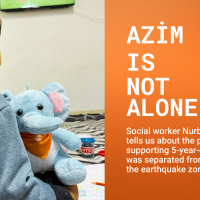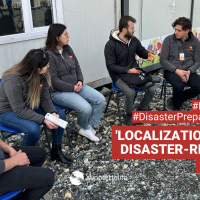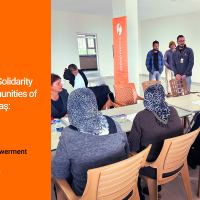Hatay was one of the provinces hardest hit by the February 6 Earthquakes. Since then, as the Support to Life’s communications team, we’ve kept a close watch on developments in the city, hearing firsthand accounts and reviewing reports from our field teams and other organizations. When we think of resilience, rebuilding lives, and solidarity, it’s impossible not to mention the women of Hatay. I’d like to introduce you to a few of them.
It was late morning on a sweltering September day when we arrived at the vocational high school in Hatay, where our culinary courses are ongoing. Since July, Support to Life (STL) has partnered with Public Education to offer culinary training here in the scope of the livelihood project financed by World Vision Syria Response. The kitchen was bustling, with two separate groups working diligently. On one side, a main course menu was coming together, while the chef on the other side was sharing tips about tartlet marmalade. Most participants in both courses are women, each attentively listening, taking notes, and following the chef’s guidance. Forty-three people, focused and cheerful, were preparing their menus together, joking with each other and displaying a remarkable team spirit. Amid the busy routine, we began chatting with some of them.
 Mavi: “In this workshop, I feel like there’s nothing I can’t do. We measure everything to the gram, cook it, and make it look beautiful. I’m especially thrilled to have learned how to make layer cakes. Now, I can take orders for birthdays. I’ve truly found my profession here.”
Mavi: “In this workshop, I feel like there’s nothing I can’t do. We measure everything to the gram, cook it, and make it look beautiful. I’m especially thrilled to have learned how to make layer cakes. Now, I can take orders for birthdays. I’ve truly found my profession here.”
Mavi is 25 years old and a university graduate—not just from one faculty but two. She completed a degree in healthcare management and an associate’s in social work through open education. She experienced the earthquake while preparing for the public service exams. After starting this pastry workshop, she grew so fond of it that she’s now working toward a diploma in culinary arts and has even registered for distance learning. Her efforts extend beyond herself, as she enrolled her mother in the high school’s culinary program. This term, they’ll both work toward culinary diplomas together.
Mavi’s knowledge of paperwork comes from experience. Since middle school, she’s had macular degeneration, causing 85% vision loss. Far from slowing her down, this has made her even more determined. She emphasizes that the earthquake disrupted every routine she’d known; familiar streets and landmarks were gone. By joining this pastry course, she’s regained a new sense of routine and a source of income in Hatay, where job opportunities are limited for someone with her vision impairment. Now, with her mother, she’s taking cake orders through Instagram and has set her sights on becoming a skilled pastry chef.
Cherry Layer Cake Recipe: Lightly moisten the layers of sponge cake with cherry syrup. Spread whipped cream generously between the layers and add whole cherries. Cover with whipped cream, garnish with more cherries, and, if desired, grate chocolate on top. Refrigerate for a few hours before serving.
 Yaşam: “The dark clouds over me have lifted. This course has dissolved the hopelessness and sadness.”
Yaşam: “The dark clouds over me have lifted. This course has dissolved the hopelessness and sadness.”
Yaşam is 56 years old and a mother of four daughters. She had been a hairdresser for twenty years before the earthquake. With her husband working abroad for years, she raised her four daughters alone, and she’s a strong, joyful, and vibrant woman. But when the earthquake destroyed her home and salon, she felt adrift. She spent sometime with her daughter in Ankara but couldn’t bear to stay away from Hatay and returned. Joining the pastry course has rekindled her dreams. Now, she makes sweets, pickles, and pastries from home. Former hairdressing clients have even started ordering her desserts. Her most popular item is kömbe.
Kömbe Recipe: Mix flour, semolina, butter, molasses, and various spices to make the dough. Add walnuts and dates to shape into small rounds. Use a kömbe mold to imprint designs on top, and bake until golden.
 Fatma: “We should open a bakery. We’d work day and night to keep it going. I believe our baklava would be especially popular.”
Fatma: “We should open a bakery. We’d work day and night to keep it going. I believe our baklava would be especially popular.”
Fatma is a 50-year-old Syrian who has faced numerous challenges in life. She was married young, endured domestic abuse, and eventually left her husband to care for her children alone. After losing two children in an airstrike during the conflict in Syria, she was displaced to Turkiye with her remaining children. Before the earthquake, she and her eldest son worked to support the family in Hatay. When the earthquake struck, everything was lost again. Today, Fatma attends the course with two neighbors. Her instructor, Ms. Kamer, praises her discipline and collaborative spirit. Above all, Fatma is grateful for a renewed sense of hope and dreams of opening a small bakery with three friends.
Baklava Recipe: Stack layers of phyllo dough, brushing each with melted butter. Evenly spread finely ground walnuts over the layers. Roll, slice, and pour melted butter on top before baking. Prepare a syrup, and once cooled, pour it over the hot baklava.
Ceyda: “My goal is to complete the necessary training, earn my master chef certificate, and become a real ‘chef.’ I wish this course would last until we qualify for our certificates.”
In the kitchen, we find Ceyda preparing the filling for Hatay’s famous pepper bread. She greets us with a warm smile and bright blue eyes. When we mention the earthquake, her face darkens. She shares that she and her husband had worked hard to build a comfortable life with several textile shops in Hatay. But they lost everything in the earthquake—home, stores, stability. The cold, the tents, the scarcity... Now they live in a container, and her worry for her daughters’ safety is evident. "I don’t let my daughters go outside; I just can’t. I’m too scared," she says.
 She and her daughter, Feraye, joined the culinary course to learn new skills and socialize. Ceyda has always loved cooking. After the earthquake, she prepared meals with the limited ingredients they received and distributed them in the container area, especially to children. Her reputation for tasty food has helped her secure a low-wage, high-hour job as a cook, though she has no certification. This income became vital when her husband was injured in a motorcycle accident, forcing her to quit her job to care for him.
She and her daughter, Feraye, joined the culinary course to learn new skills and socialize. Ceyda has always loved cooking. After the earthquake, she prepared meals with the limited ingredients they received and distributed them in the container area, especially to children. Her reputation for tasty food has helped her secure a low-wage, high-hour job as a cook, though she has no certification. This income became vital when her husband was injured in a motorcycle accident, forcing her to quit her job to care for him.
When neighbors told her about this course, she immediately registered. Her dream now is to complete enough training hours to qualify for first a journeyman and eventually a master chef certificate. Her hope is to return to professional cooking and earn a fair wage.
Hatay Pepper Bread Recipe: Mix lukewarm water, sugar, and yeast, allowing it to foam. Separately, blend olive oil, milk, and salt, then combine with the yeast mixture. Knead into a soft dough and let it rise. For the topping, mix pepper paste, spices, sesame, olive oil, and sautéed onions. Shape dough pieces, spread the topping, and bake at 180°C.
Producing Together Heals
In our culinary kitchen, I see that these meals, prepared with a sense of unity, are seasoned with hope and dreams. After the courses concluded in late September, some participants began three-month supported employment. I believe these determined women will continue to succeed. Learning and producing together is crucial for post-disaster recovery. Accessing income sources is essential. While savoring their talents, these women are rebuilding their lives and their city, one recipe at a time.
My thanks go to Mavi, Yaşam, Fatma, and Ceyda* for sharing their stories. May their journeys be filled with success.
*The names of the beneficiaries whose testimonies are included in this article have been changed to protect their personal rights
**This article was published in Gazete Oksijen on November 1, 2024.
Çiğdem Usta Güner
STL Communications Manager / Istanbul
Thank you for reading the article and for coming this far. Now you can support life while you are here.










